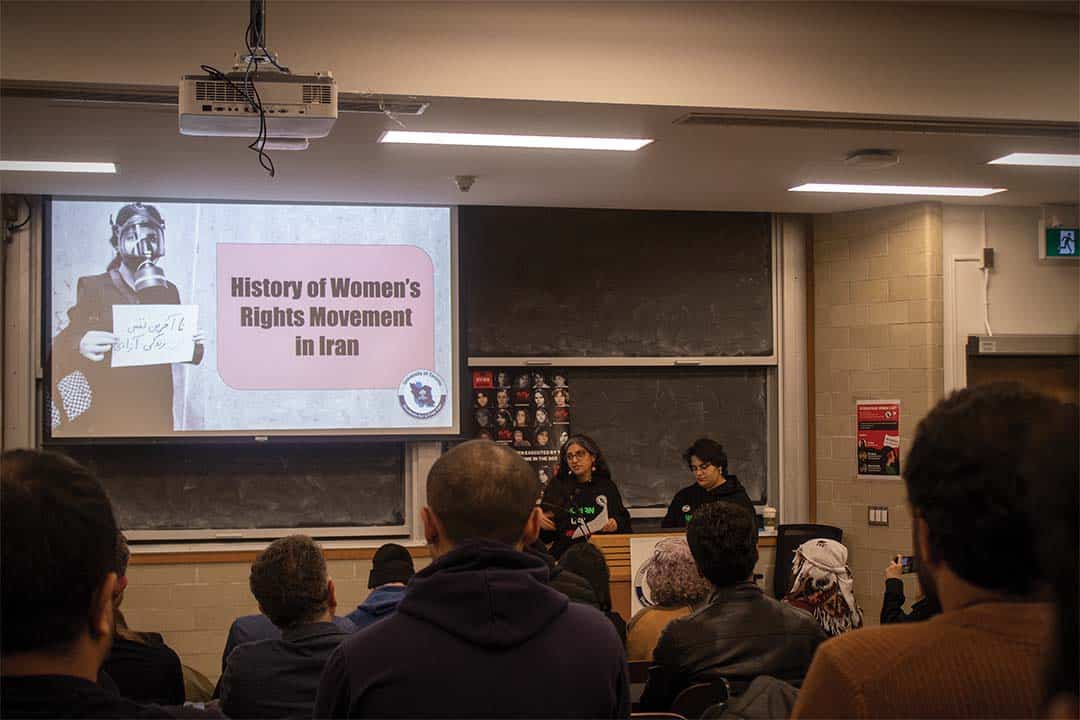On March 8, International Women’s Day, around 80 members of the U of T and wider Toronto community gathered at the Galbraith Building to discuss gender inequality in Iran and how Iranian women activists have stood up against gender-based oppression.
University of Toronto Students for a Free Iran (UTSFI) and Iranian Scholars for Liberty jointly organized the event. The evening featured virtual and live speeches, educational videos, a musical performance, and photographic displays.
The gathering marked the first International Women’s Day since the start of worldwide protests against the Iranian regime, which were sparked by Iranian morality police killing Iranian Kurdish woman Mahsa (Jina) Amini on September 16, 2022. Since the Iranian Revolution in 1979, an Islamic theocracy has ruled the country of 87 million, with policies including arbitrary detentions, state-sponsored terrorism, and what many call the world’s worst oppression against women.
Niloofar Ganji, a second-year PhD student at the Institute of Medical Sciences and a UTSFI general executive member, told The Varsity, “The way in which women’s rights in Iran are denied… is incomprehensible to Western societies.” She added that the UTSFI stands in solidarity with Afghan women whose rights have similarly been eroded under the Taliban.
The event
Maryam Rahimi Shahmirzadi, a UTSFI member, introduced the event as a way to “celebrate the many achievements of Iranian women,” as well as to raise awareness about gender-based discrimination in Iran. She also called on the Canadian government to take action against the Iranian regime.
The first speaker was Iranian Kurdish novelist, journalist, and activist Ava Homa, who currently resides and works in Canada. She highlighted the importance of the work being done by young Iranian activists and discussed the struggles they face as they fight against direct violence from the state, as well as ingrained social biases against women, and other marginalized groups. She also spoke on the importance of literature by female writers to foster dialogue on issues impacting women.
Guita Banan, a PhD candidate at York University studying feminism and critical race theory, was the second speaker. Banan discussed the “muddle of feelings” she has felt as an Iranian living abroad when witnessing current events in her home country, as she can only support the activism in Iran from a distance.
The third speaker was Elham Asadzadeh, whose brother was killed in Iran in November 2022 for painting a protest mura, spoke about the women who have driven forth the current movement for liberty in the country, and discussed how several female activists have supported her family after her brother’s death. She encouraged the audience to support Iranian activists in their current efforts.
After the three speeches, the organizers played a video that featured the Mothers for Justice, an activism group based in Iran and made up of women whose family members had been killed at protests. The video depicted how members of the group continue to seek justice for their loved ones and publicly resist the regime.
After a short break, Aria and Neda — two artists from the Sarv Music Academy in North York — gave a musical performance in Farsi. Then two UTSFI members — Sara Shariati and Parastoo Azizi — gave a presentation on the history of the women’s rights movement in Iran. The presentation highlighted several influential Iranian women activists from the early 1900s to the modern day. Azizi remarked, “As long as there has been patriarchy, there has been resistance.”
The organizers played another video that was created by the Association of Families of Flight PS752 Victims. The video brought attention to the Iranian regime’s oppression of women and some of the challenges and discriminatory policies, which women in Iran face. The video also highlighted the work Iranian women activists have done to advance gender equality.
To conclude the event, Ganji delivered a statement from the Iranian Scholars for Liberty on gender-based oppression in Iran. The statement highlighted how women-led movements for equality and freedom have led to significant positive change throughout history, and encouraged attendees to support Iranian activists in their current “fight for woman, life, freedom.”
Community reactions
Among the attendees was Fereshteh Nezakati, an activist from Iran currently residing in Canada. She told The Varsity that the UTSFI members’ presentation during the event illuminated statistics that were new to her. The presenters echoed statistics from the group Human Rights Activists in Iran, which reported that official reports and activists suspect that 290 school attacks targeting girls and affecting at least 7,060 students have occurred in Iran in recent months.
She said that she was already familiar with women’s struggles in Iran as she had also experienced them. She told The Varsity, “We’re here to continue the fight.”
A second-year student studying sociology at UTSG, who asked to remain anonymous due to fear of repercussions from the Iranian regime, told The Varsity, “The problem we’re dealing with, it’s not just one or two, it’s all of them, it’s [accumulated over] 40 years.” She said that the event gave her new hope, and explained, “It’s heartwarming to see people from all nationalities, from all backgrounds, [and] from all ages gathered here.”
With files from Caroline Bellamy.


